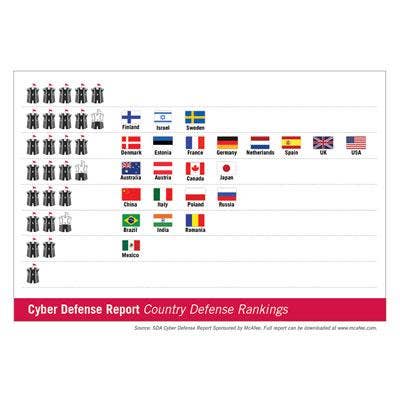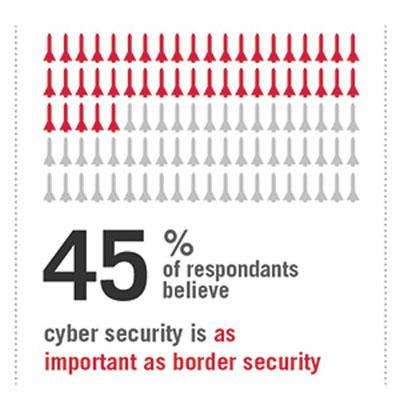Cybersecurity Experts: What They Know Could Scare You

An Arms Race In Cyperspace
More than half of security experts believed a worldwide arms race was taking place in cyberspace, where security was more important than missile defense in protecting critical infrastructure. That was one of the findings in a recent report from Intel-owned McAfee and the Brussels think tank Security & Defence Agenda. Titled Cyber-security: The Vexed Question of Global Rules, the report provides a snapshot of current thinking among some 80 leading policymakers and cybersecurity experts in government, business and academia. In addition, 250 world leaders were surveyed in 35 countries. Here are some of the highlights.

Nation Ranking
In a ranking of 23 countries based on their state of cyber-readiness, the U.S., Australia, the United Kingdom, China and Germany fell behind smaller nations, such as Israel, Sweden and Finland. China, Russia, Italy and Poland were seen as having the lowest levels of preparedness for cyberattacks.

International Threat
More than eight in 10 experts polled agreed that cyberattacks were a threat to national and international security and trade. Nearly three-quarters said cybersecurity was more or equally important as missile defense and more than half agreed that an arms race was under way in cyberspace.

Scare-Mongering
Some experts were unhappy with the term 'cyberwar.' More than one-quarter said it was inaccurate and outright scare-mongering, while 45 percent believed the term was accurate and should be used.

Cybersecurity Vs. Border Security
People interviewed in the report were divided over whether cybersecurity was as important as border security. Almost half believed it was, while 35 percent said cybersecurity was less important.

Cybersecurity Spending
Because of the threats combated by cybersecurity, more than six in 10 of the interviewed experts said it should be protected from budget cuts, while less than one in 10 said it shouldn't. Roughly the same proportion said cyberspace was similar to sea or space.

Governments Disagree On Solution
While almost everyone in the report believed cybersecurity exercises were important, only one-fifth in the private sector had taken part in such exercises. Governments acknowledged a need for standards, laws, and possibly a global treaty to fight cybercrime, but very few could agree on how to get there. Debate over who should make the rules was just one hurdle, as well as deciding to what extent the military should get involved.

Infrastructure At Risk
The greatest single threat posed by cyberattacks was damage or disruption to critical infrastructure, most experts agreed. More than four in 10 said such attacks were a national threat with wide economic consequences.

The Cyberespionage Threat
Fully 15 percent of experts believed cyberespionage along with theft of personal data and intellectual property was the greatest threat. In addition, one in 10 said cyberattacks damaged the credibility of governments and organizations and our trust in them.